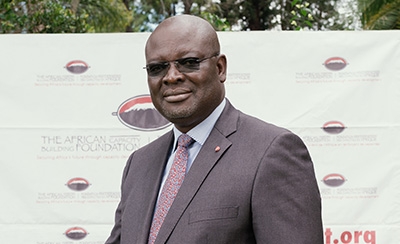
The African Capacity Building Foundation’s (ACBF), Executive Board has appointed Mr. Mamadou Biteye as the new Executive Secretary.
He succeeds Professor Emmanuel Nnadozie, who has retired after completing two terms (8 years) at the helm of the Foundation.
Mr. Biteye brings with him over 30 years of field experience in capacity building across the continent and around the world.
His experience in the private and public sector, as well as with leading international development agencies, will be key in driving forward the Foundation’s mandate to enhance capacity across Africa, at a time of rapid transformation around the world.
An agricultural economist by training, Mr. Biteye has a wealth of expertise in the development sector in Africa. His work experience includes strategic leadership, program development and implementation, public policy analysis, advocacy and campaigning and community participatory development.
Mr. Biteye joins ACBF from VISA, where he served as Vice-President, Global Head of Inclusive Growth and before that as Regional Head of Social Impact for the Central and Eastern Europe, Middle East, and Africa Region. In those roles, he worked with non-profit clients and government organizations to bring the VISA social impact vision to life in markets around the world.
At VISA, Mr. Biteye collaboratively developed a global digital financial education strategy and forged strategic multi-stakeholder partnerships.
This expertise in stakeholder management will be key at ACBF, which has been stepping up relations with key partners to support transformative programing across Africa.
Prior to joining VISA, Mr. Biteye worked as Managing Director, Africa Regional Office for the Rockefeller Foundation, overseeing the Foundation’s work across the continent. This included work on youth employment, health, philanthropy, agriculture, and food security.
During this assignment, he led the implementation of programs that serve as a strong model for how Africa can enhance skills capacity among its young people.
This included the Digital Jobs Africa initiative, under which over 160,000 youths received demand-driven employability training and the Global Impact Sourcing Coalition was formed.
Apart from the youth, Mr. Biteye’s work experience in capacitating vulnerable populations also included measurable programs to support women.
In a previous role as Oxfam’s Regional Director for West Africa, Mr. Biteye co-designed “Saving for Change” an innovative micro-finance programme that is today improving the lives of over 700,000 women in Mali and Senegal.
He also has experience in a field that is key to ACBF’s mandate, improving policy processes for African institutions and governments. At Oxfam, he played a key role in the development of the Economic Community of West African States (ECOWAS)’ Convention on Small Arms and Regional Mining Directives.
ACBF is currently working with agencies around Africa to enhance the capacity of farmers to improve efficiencies. The Foundation will therefore, benefit from Mr. Biteye’s experience in leading the design and implementation of YieldWise, an effort by the Rockefeller Foundation and its partners to halve post-harvest loss in Kenya, Tanzania, and Nigeria.
At the policy level, one of the new Executive Secretary’s successes in previous roles include the convening of the Leadership for Agriculture (L4Ag) network of African ministers of agriculture and ministers of finance. The platform enabled them to work closer together to share experiences and to attract more investment to transform agriculture.
Mr. Biteye serves as an adviser and Board member of several organizations such as, the World Bank’s S4YE, the African Women Impact Fund, the Center for African Philanthropy and Social Investment at the University of Witwatersrand, the Global Mentorship Initiative and myAgro. In 2019, he was listed among the 100 Most Influential Africans by The Africa Report.
He holds a Masters’ Degree in Agricultural Economics from the Ohio State University and a Master’s Degree and Bachelor of Science Degree in Agricultural Economics from The Crimean Agricultural Institute.





